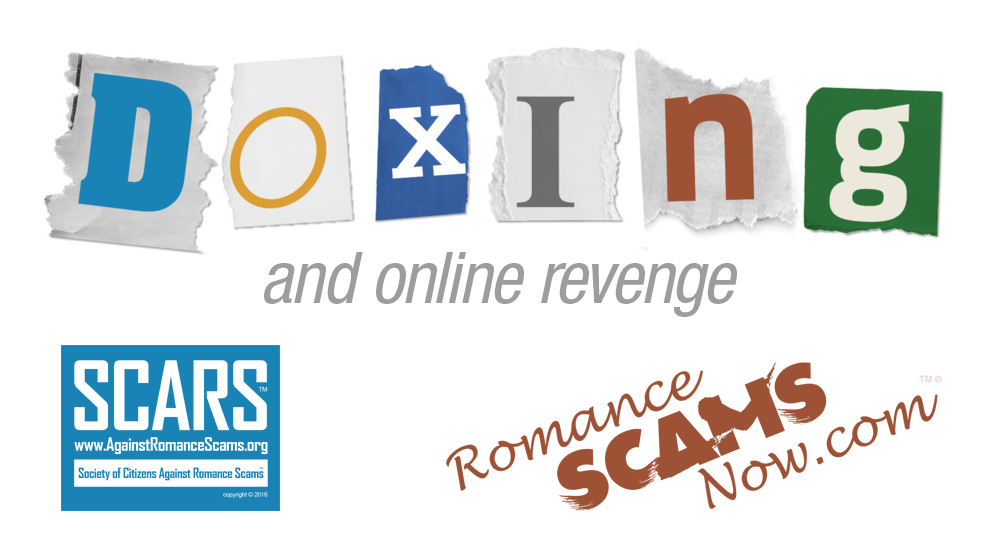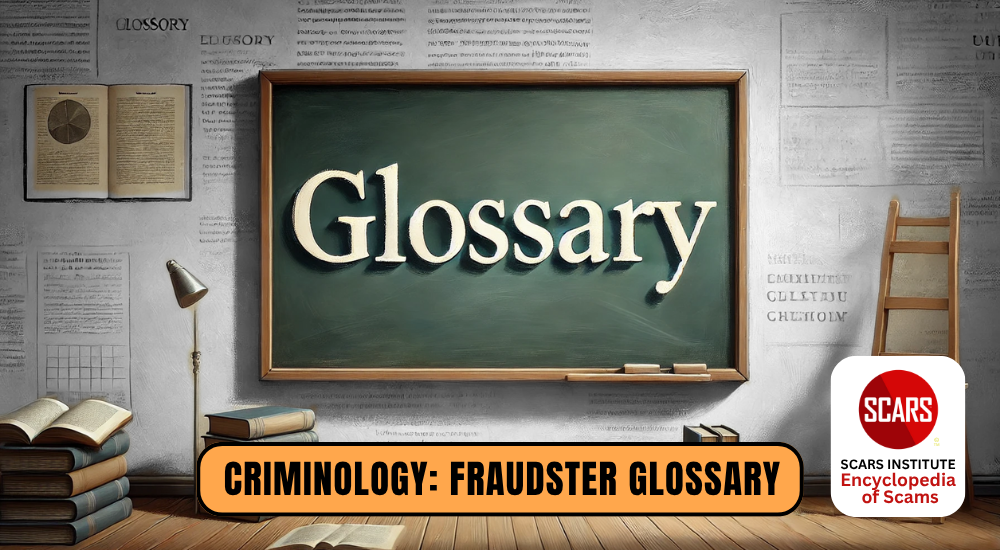
SCARS Institute’s Encyclopedia of Scams™ Published Continuously for 25 Years

RSN™ Guide: Doxing & Scammer Revenge
Exposing Your Personal Information For Revenge
As we have said before, most scammer threats are just more lies attempting to get victims to pay.
However, there are a couple of cases where they may engage in revenge if the victims confront and angers the scammer needlessly. The best strategy is always to go silent and block everywhere!
REMEMBER: DO NOT CONFRONT YOUR SCAMMERS
What Is DOXING?
Doxing (from dox, an abbreviation of documents) or doxing is the Internet-based practice of researching and broadcasting private or identifiable information (especially personally identifiable information) about an individual or organization.
The methods employed to acquire this information include searching publicly available databases and social media websites (like Facebook), hacking, and social engineering. It is closely related to Internet vigilantism and hacktivism.
Doxing may be carried out for various reasons, including to aid law enforcement, business analysis, risk analytics, extortion, coercion, inflict harm, harassment, online shaming, and vigilante justice.
Anyone can harvest information from the Internet about individuals. There is no particular structure in place for doxing, meaning someone may seek out any kind of information related to the target.
A basic Web search can yield results. Social media platforms like Facebook, Twitter, MySpace, and Linkedin offer a wealth of private information because many users have high levels of self-disclosure (i.e. sharing their photos, place of employment, phone number, email address), but low levels of security. It is also possible to derive a person’s name and home address from a cell-phone number, through such services as reverse phone lookup. Social engineering has been used to extract information from government sources or phone companies.
In addition to these, a doxxer may use other methods to harvest information. These include information search by domain name and location searching based on an individual’s IP address.
Once people have been exposed through doxing, they may be targeted for harassment through methods such as harassment in person, fake signups for mail and pizza deliveries, or through swatting (dispatching armed police to their house through spoofed tips).
A hacker may obtain an individual’s dox without making the information public. A hacker may look for this information in order to extort or coerce a known or unknown target. Also, a hacker may harvest a victim’s information in order to break into their Internet accounts or to take over their social media accounts.
The victim may also be shown their details as proof that they have been doxed in order to intimidate or blackmail. The perpetrator may use this fear and intimidation to gain power over the victim in order to extort or coerce. Doxing is, therefore, a standard tactic of online harassment and has been used by people associated with 4chan and in the Gamergate and vaccine controversies.
The ethics of doxing by journalists, on matters that they assert are issues of public interest, is an area of much controversy. Many authors have argued that doxing in journalism blurs the line between revealing information in the interest of the public and releasing information about an individual’s private life against their wishes.
Is DOXING Illegal? Yes, ALWAYS!
Doxing is always illegal, whether it is done against a federal employee, a state employee, or a regular person. There are federal and state laws that specifically address doxing government employees. With regular citizens, doxing falls under various state criminal laws, such as stalking, cyberstalking, harassment, threats, and other such laws, depending on the state.
Our own employees have been harassed and dox’ed by other anti-scam haters. We followed the civil route and engaged in litigation, which we have won in all cases.
For more information on why Doxing is illegal click here »
If you have been dox’ed you need to file complaints with the services involved, such as Facebook.
However …
If we receive a report of a scammer and this proves to be a false report we will remove it. But if we reasonably believe the scammer report is valid, we typically decline to remove them. In either case, the information will have been reported to law enforcement and other authorities for them to determine if valid or not.

RSN™ Team
a division of SCARS™
Miami Florida U.S.A.
END
WESTERN UNION REPAYMENT PROGRAM NEWS
FOR THE LATEST INFORMATION ABOUT THE WESTERN UNION REPAYMENT / REMISSION PROGRAM CLICK HERE – IT IS STILL OPEN FOR A PETITIONS FOR REPAYMENT
– – –
Tell us about your experiences with Romance Scammers in our Scams Discussion Forum on Facebook »
FAQ: How Do You Properly Report Scammers?
It is essential that law enforcement knows about scams & scammers, even though there is nothing (in most cases) that they can do.
Always report scams involving money lost or where you received money to:
- Local Police – ask them to take an “informational” police report – say you need it for your insurance
- Your National Police or FBI (www.IC3.gov)
- The Scars Worldwide Reporting Network HERE or on www.Anyscam.com
This helps your government understand the problem, and allows law enforcement to add scammers on watch lists worldwide.
Visit our NEW Main SCARS™ News & Information Facebook page for much more information about scams and online crime: www.facebook.com/SCARS.News.And.Information
To learn more about SCARS visit www.AgainstScams.org
Please be sure to report all scammers HERE or on www.Anyscam.com
All original content is Copyright © 1991 – 2018 SCARS All Rights Reserved Worldwide & Webwide – RSN/Romance Scams Now & SCARS/Society of Citizens Against Romance Scams are all trademarks of Society of Citizens Against Romance Scams Inc.
-/ 30 /-
What do you think about this?
Please share your thoughts in a comment below!
Table of Contents
- Exposing Your Personal Information For Revenge
- REMEMBER: DO NOT CONFRONT YOUR SCAMMERS
- What Is DOXING?
- Is DOXING Illegal? Yes, ALWAYS!
- However …
- WESTERN UNION REPAYMENT PROGRAM NEWS
- Tell us about your experiences with Romance Scammers in our Scams Discussion Forum on Facebook »
- Please be sure to report all scammers HERE or on www.Anyscam.com
LEAVE A COMMENT?
Recent Comments
On Other Articles
- Arwyn Lautenschlager on Love Bombing And How Romance Scam Victims Are Forced To Feel: “I was love bombed to the point that I would do just about anything for the scammer(s). I was told…” Feb 11, 14:24
- on Dani Daniels (Kira Lee Orsag): Another Scammer’s Favorite: “You provide a valuable service! I wish more people knew about it!” Feb 10, 15:05
- on Danielle Delaunay/Danielle Genevieve – Stolen Identity/Stolen Photos – Impersonation Victim UPDATED 2024: “We highly recommend that you simply turn away form the scam and scammers, and focus on the development of a…” Feb 4, 19:47
- on The Art Of Deception: The Fundamental Principals Of Successful Deceptions – 2024: “I experienced many of the deceptive tactics that romance scammers use. I was told various stories of hardship and why…” Feb 4, 15:27
- on Danielle Delaunay/Danielle Genevieve – Stolen Identity/Stolen Photos – Impersonation Victim UPDATED 2024: “Yes, I’m in that exact situation also. “Danielle” has seriously scammed me for 3 years now. “She” (he) doesn’t know…” Feb 4, 14:58
- on An Essay on Justice and Money Recovery – 2026: “you are so right I accidentally clicked on online justice I signed an agreement for 12k upfront but cd only…” Feb 3, 08:16
- on The SCARS Institute Top 50 Celebrity Impersonation Scams – 2025: “Quora has had visits from scammers pretending to be Keanu Reeves and Paul McCartney in 2025 and 2026.” Jan 27, 17:45
- on Scam Victims Should Limit Their Exposure To Scam News & Scammer Photos: “I used to look at scammers photos all the time; however, I don’t feel the need to do it anymore.…” Jan 26, 23:19
- on After A Scam, No One Can Tell You How You Will React: “This article was very informative, my scams happened 5 years ago; however, l do remember several of those emotions and/or…” Jan 23, 17:17
- on Situational Awareness and How Trauma Makes Scam Victims Less Safe – 2024: “I need to be more observant and I am practicing situational awareness. I’m saving this article to remind me of…” Jan 21, 22:55
ARTICLE META
Important Information for New Scam Victims
- Please visit www.ScamVictimsSupport.org – a SCARS Website for New Scam Victims & Sextortion Victims
- Enroll in FREE SCARS Scam Survivor’s School now at www.SCARSeducation.org
- Please visit www.ScamPsychology.org – to more fully understand the psychological concepts involved in scams and scam victim recovery
If you are looking for local trauma counselors please visit counseling.AgainstScams.org or join SCARS for our counseling/therapy benefit: membership.AgainstScams.org
If you need to speak with someone now, you can dial 988 or find phone numbers for crisis hotlines all around the world here: www.opencounseling.com/suicide-hotlines
A Note About Labeling!
We often use the term ‘scam victim’ in our articles, but this is a convenience to help those searching for information in search engines like Google. It is just a convenience and has no deeper meaning. If you have come through such an experience, YOU are a Survivor! It was not your fault. You are not alone! Axios!
A Question of Trust
At the SCARS Institute, we invite you to do your own research on the topics we speak about and publish, Our team investigates the subject being discussed, especially when it comes to understanding the scam victims-survivors experience. You can do Google searches but in many cases, you will have to wade through scientific papers and studies. However, remember that biases and perspectives matter and influence the outcome. Regardless, we encourage you to explore these topics as thoroughly as you can for your own awareness.
Statement About Victim Blaming
SCARS Institute articles examine different aspects of the scam victim experience, as well as those who may have been secondary victims. This work focuses on understanding victimization through the science of victimology, including common psychological and behavioral responses. The purpose is to help victims and survivors understand why these crimes occurred, reduce shame and self-blame, strengthen recovery programs and victim opportunities, and lower the risk of future victimization.
At times, these discussions may sound uncomfortable, overwhelming, or may be mistaken for blame. They are not. Scam victims are never blamed. Our goal is to explain the mechanisms of deception and the human responses that scammers exploit, and the processes that occur after the scam ends, so victims can better understand what happened to them and why it felt convincing at the time, and what the path looks like going forward.
Articles that address the psychology, neurology, physiology, and other characteristics of scams and the victim experience recognize that all people share cognitive and emotional traits that can be manipulated under the right conditions. These characteristics are not flaws. They are normal human functions that criminals deliberately exploit. Victims typically have little awareness of these mechanisms while a scam is unfolding and a very limited ability to control them. Awareness often comes only after the harm has occurred.
By explaining these processes, these articles help victims make sense of their experiences, understand common post-scam reactions, and identify ways to protect themselves moving forward. This knowledge supports recovery by replacing confusion and self-blame with clarity, context, and self-compassion.
Additional educational material on these topics is available at ScamPsychology.org – ScamsNOW.com and other SCARS Institute websites.
Psychology Disclaimer:
All articles about psychology and the human brain on this website are for information & education only
The information provided in this article is intended for educational and self-help purposes only and should not be construed as a substitute for professional therapy or counseling.
While any self-help techniques outlined herein may be beneficial for scam victims seeking to recover from their experience and move towards recovery, it is important to consult with a qualified mental health professional before initiating any course of action. Each individual’s experience and needs are unique, and what works for one person may not be suitable for another.
Additionally, any approach may not be appropriate for individuals with certain pre-existing mental health conditions or trauma histories. It is advisable to seek guidance from a licensed therapist or counselor who can provide personalized support, guidance, and treatment tailored to your specific needs.
If you are experiencing significant distress or emotional difficulties related to a scam or other traumatic event, please consult your doctor or mental health provider for appropriate care and support.
Also read our SCARS Institute Statement about Professional Care for Scam Victims – click here to go to our ScamsNOW.com website.



















Thank you for your comment. You may receive an email to follow up. We never share your data with marketers.